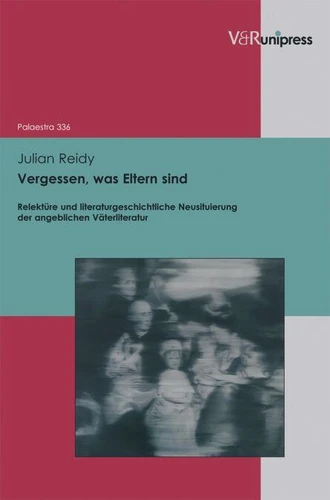Vergessen, was Eltern sind. Relektüre und literaturgeschichtliche Neusituierung der angeblichen Väterliteratur
Par : , , ,Formats :
Disponible dans votre compte client Decitre ou Furet du Nord dès validation de votre commande. Le format PDF est :
- Compatible avec une lecture sur My Vivlio (smartphone, tablette, ordinateur)
- Compatible avec une lecture sur liseuses Vivlio
- Pour les liseuses autres que Vivlio, vous devez utiliser le logiciel Adobe Digital Edition. Non compatible avec la lecture sur les liseuses Kindle, Remarkable et Sony
 , qui est-ce ?
, qui est-ce ?Notre partenaire de plateforme de lecture numérique où vous retrouverez l'ensemble de vos ebooks gratuitement
Pour en savoir plus sur nos ebooks, consultez notre aide en ligne ici
- Nombre de pages356
- FormatPDF
- ISBN978-3-86234-926-5
- EAN9783862349265
- Date de parution18/01/2012
- Protection num.pas de protection
- Taille2 Mo
- Infos supplémentairespdf
- ÉditeurV&R Unipress
Résumé
This study deals with the literary treand known as "Väterliteratur": The successful "Väterbücher", most of which were published in the 1970s, are commonly thought to be manifestations of confrontations with fathers who were possibly complicit in Nazi crimes and who symbolically represent this problematic past. The whole genre is usually considered to be an ancillary phenomenon to the so-called "Neue Subjektivität".
The book raises the question whether these terms and classifications are actually meaningful and helpful in reading and understanding the "Väterliteratur". On the basis of extensive textual analyses coupled with critical re-evaluations of existing scholarship on the subject, the study calls into question the suitability of "Väterliteratur" as a concept in literary history and proposes alternative approaches to the works the term encompasses.
The book raises the question whether these terms and classifications are actually meaningful and helpful in reading and understanding the "Väterliteratur". On the basis of extensive textual analyses coupled with critical re-evaluations of existing scholarship on the subject, the study calls into question the suitability of "Väterliteratur" as a concept in literary history and proposes alternative approaches to the works the term encompasses.
This study deals with the literary treand known as "Väterliteratur": The successful "Väterbücher", most of which were published in the 1970s, are commonly thought to be manifestations of confrontations with fathers who were possibly complicit in Nazi crimes and who symbolically represent this problematic past. The whole genre is usually considered to be an ancillary phenomenon to the so-called "Neue Subjektivität".
The book raises the question whether these terms and classifications are actually meaningful and helpful in reading and understanding the "Väterliteratur". On the basis of extensive textual analyses coupled with critical re-evaluations of existing scholarship on the subject, the study calls into question the suitability of "Väterliteratur" as a concept in literary history and proposes alternative approaches to the works the term encompasses.
The book raises the question whether these terms and classifications are actually meaningful and helpful in reading and understanding the "Väterliteratur". On the basis of extensive textual analyses coupled with critical re-evaluations of existing scholarship on the subject, the study calls into question the suitability of "Väterliteratur" as a concept in literary history and proposes alternative approaches to the works the term encompasses.



